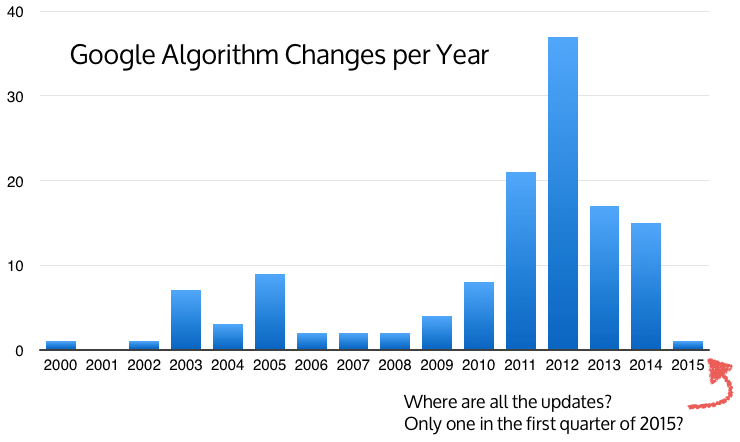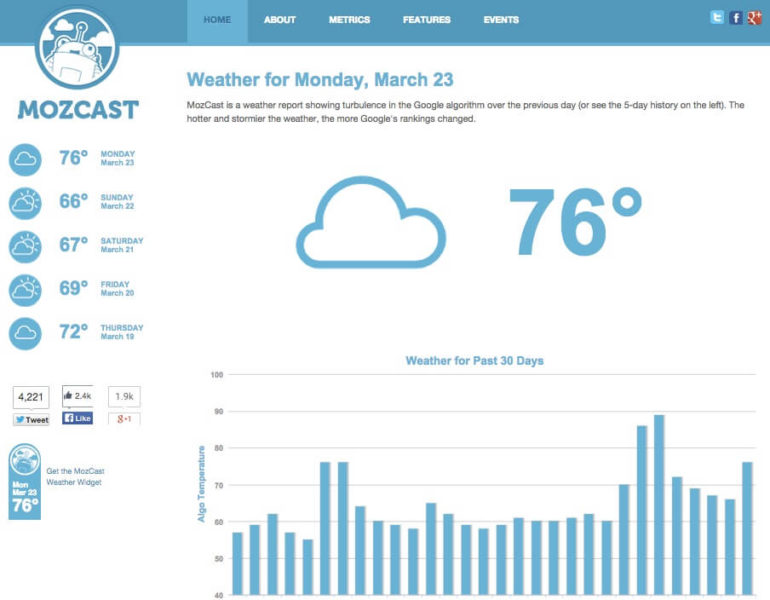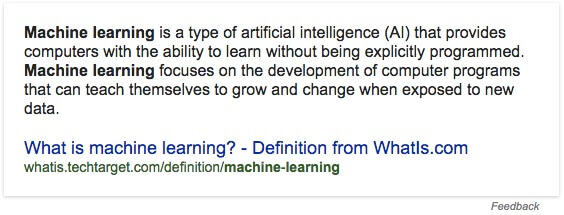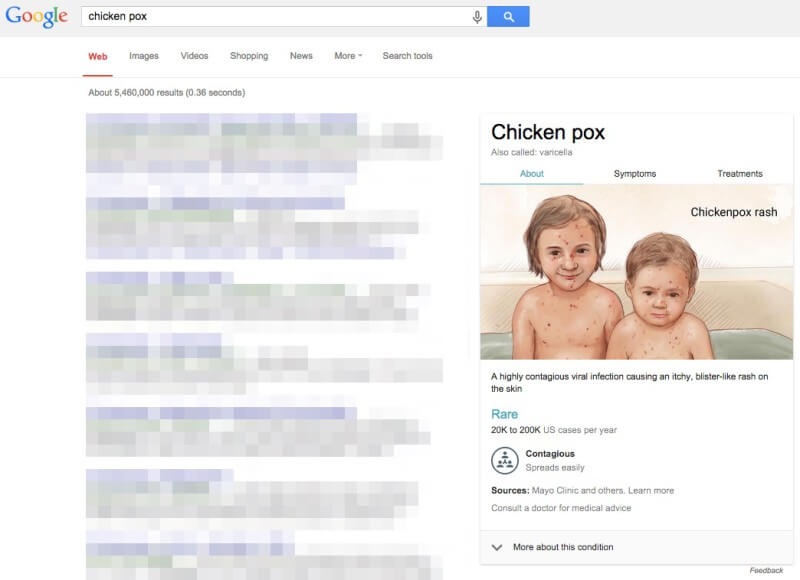They Fooled Us All: Why Google May No Longer Announce Major Algorithm Updates
Google’s investment in artificial intelligence does more than just create better search results; it allows Google’s engineers to make constant algorithm changes right under our noses. Columnist Nate Dame explains.
Has anyone else noticed that we’ve been seeing fewer algorithm update announcements from Google in recent years? That Google’s PR campaigns about changing search results has been quieting down?
If you have, rest assured: you’re not crazy.
I scrolled through Moz’s Google Algorithm Change History recently and graphed the number of changes by year (an imperfect study, probably, but a pretty good general standard).
Since a dramatic peak in 2012, the number of update announcements has been dropping. (That low number for 2015 is my own projection, based on what we’ve seen so far and on what you’re about to read.)
Why?
Two Reasons For Fewer Google Algo Update Announcements
I don’t think that Google will ever kick back, put up their collective feet, and stop updating. So why the drop?
1. Mind Control: Google Wants To Change SEO Behavior
First, Google doesn’t make those big announcements just to ensure sure that all their friends in the SEO community are on the same happy page. They announce algorithm updates because they want to change SEO behavior.
The war on links is a great example. Google doesn’t want its bots fooled by spammy backlinks, so along comes Penguin. They could have released the algorithm change, and all its subsequent updates, without a word; but, in addition to actually devaluing bad links, they also want black hat SEOs to just stop it already.
In that regard, fewer updates means Google sees less of a need to change our behavior. Have they beaten the SEO world into submission? Whipped us into shape? Or just stopped caring if we’re on board?
2. Conditioning: Google Wants To Switch To Constant, Imperceptible Updates
Second, at the risk of sounding like a dramatic sci-fi narrator: artificial intelligence. Google is already releasing algorithms that learn. The latest, dubbed “DQN,” is learning and mastering Atari games all on its own.
Google search results are always gettings smarter. The changes in results are becoming deliberately more subtle and more intuitive, such that most users hardly notice them at all. If Google’s algorithms are in the early stages of learning, they can easily make small, undercover changes on the fly.
The number of unnamed and unconfirmed updates bears this out. Just last month, SERP-trackers and webmasters noticed some major shifts in search results, but Google has yet to officially confirm the update. Are those relatively minor updates unannounced because they’re not worth the PR effort, or because Google didn’t intend for us to notice?
If it weren’t for tools like MozCast and other SERP-tracking utilities, many of those updates might go unnoticed. On the other hand, the MozCast might make these sneaky updates even easier for Mountain View engineers — even they can watch the MozCast to make sure their changes stay just below the radar.
This begs the question: How many changes do go unnoticed? Are we catching them all? Is Google’s future in AI learning machines that can make quiet, invisible updates day in and day out?
Google Is Investing Heavily in AI
It’s no secret that Google has a lot of skin in the game when it comes to artificial intelligence. Google has been slowly collecting researchers and developers, scattering the purchase of various departments over continents and years… probably in hopes that no one would notice. Oh, we noticed.
- March 2013: Google acquires DNNresearch, a neural network startup out of the University of Toronto, and gets the team refocused on expanding traditional search algorithms.
- January 2014: Google acquires DeepMind and sets up the artificial intelligence team to work directly with the Knowledge team on Google’s search algorithms. (They also, almost immediately, set up an AI ethics board — presumably, to save the human race from AI-wrought extinction.)
- September 2014: Google expanded research surrounding quantum computing by hiring John Martinis and his research team out of UCSB.
- October 2014: Google acqui-hires two teams of AI researchers from Oxford (and announces a partnership with the University) to “enable machines to better understand what users are saying to them.”
Google has put up a pretty penny to build a team of researchers that can push machines to the very edge of artificial intelligence.
Google Is Already Smarter Than We Realize
The new development may not impose dramatic changes on Google search right away, but not because it’s not applicable.
The truth is, soft AI is pretty much everywhere these days, and Google has been employing machine learning techniques since the Panda update (and probably further back still). Google’s own super-smart Knowledge Graph is friendly enough to inform us that machine learning is, in fact, a type of artificial intelligence.
Is it possible that the reason we have only seen one major update so far in 2015 (and an unnamed update at that) is that Google no longer needs to launch major algorithm changes? If its AI bots are busily making small, under-the-radar updates every minute of the day, Google might never have to launch (and therefore announce) another update ever again.
The Future Could Get Even Weirder
That the future of algorithm updates is up in the air is somewhat unsettling, but it may only be the beginning.
Google already curates its own medical information, in part to protect us from misinformation I’m sure. (Has anyone else noticed that medical keywords are some of the most expensive keywords AdWords has to offer?)
Next, it might be checking facts for us to determine rankings. No matter where you land on the political spectrum, there is a valid concern that this type of algo could stifle bold new voices in the scientific community.
[blockquote cite=”Jim Purtilo, Associate Professor of Computer Science at U of Maryland”]It could make it more difficult for bright young people to bring about the next revolution in science. After all, most of today’s established science came about because someone challenged the herd mentality of yesterday.[/blockquote]
What’s A Marketer to Do?
Will Google’s search algorithms soon be driven primarily, or completely, by artificially intelligent machines?
Even though Google’s tactics are changing, their endgame is not. That means the intersection of SEO and content marketing is still the sweet spot for marketers to focus on:
- Identify specific, measurable attributes of high-quality content, and put them into practice. Google’s algorithm updates may be more like ninjas than Goliaths from here on out, but the goal is the same. Keep your eye (and your SEO) on the prize.
- Think user intent, not just keywords. The later are still valuable, but only in the context of the former. Keep improving how you talk to your audience, not how you talk to search engines.
- Kill the silos and blend SEO into your broader marketing efforts. SEO is marketing, and marketing needs SEO. Welcome to the future.
It also may be a good idea to understand Google’s Knowledge Graph, as it is probably the harbinger of what is coming.
The Certainty Of Change
The future of search is simultaneously settled and uncertain. Google wants to deliver the best user experience possible, but how they do it and what it looks like on SERPs is (still) constantly changing.
And until you can beat its high score on Space Invaders, it doesn’t have to tell you about updates if it doesn’t want to.
Opinions expressed in this article are those of the guest author and not necessarily Search Engine Land. Staff authors are listed here.
Related stories
New on Search Engine Land




